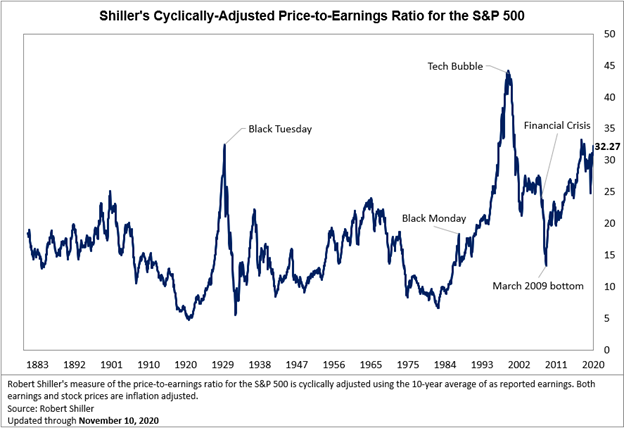Higher inflation now would be a genuine surprise to markets. Equities and bonds are priced as if low interest rates, even negative ones, will last for years.
But recent data show that inflation might not be dead after all.
Could inflation rise? What would happen to markets?
In the early years of my career inflation was hot. Rising prices as measured by the CPI were above 10 percent annually in the early 1980s, pushing interest rates up to 15 percent on long-term bonds as the Volcker Federal Reserve tried to get inflation under control. Since peaking in 1981 inflation and interest rates have trended lower. Recently interest rates went to negative values in some countries while inflation became a non-issue.
For equity markets the inflation rate and long-term interest rates are a proxy for the discount rate for earnings in future years. When inflation and interest rates were above 10 percent, the impact on share values was extremely negative, as owning shares had to compete with government bonds that produced substantial income every year. In other words, if investors could not get their money back with earnings and dividends quickly, they were not interested in holding shares.
For this reason, at least in part, the S&P 500 in 1982 went to its lowest level in the last 80 years, as measured by the price to earnings ratio. Using the Shiller CAPE, we can see how market valuations reached a low point in 1982, 1920 and 1932.

The Shiller CAPE value today is close to 32, while in 1982 it dipped to about 5, as it did in 1920 and 1932. A dramatic rise in inflation and interest rates now would impact the Shiller ratio, forcing it lower. The key factor in pushing interest rates higher would be rising inflation.
What would make inflation rise? The election of Democrats, in the Presidency and the House of Representatives, makes it likely that new government policies will be enacted that would push inflation higher. A record fiscal deficit, along with rapid growth in the money supply – M2 was growing at a record high 23.7 percent recently - could set the conditions for higher inflation. The negative view regarding Chinese imports could lessen their deflationary impact. A higher minimum wage is likely along with programs to push more government spending into the economy.

One classic cause of higher inflation is too much money chasing too few goods. While we do not know yet if this will happen, the risk is there.
Investors can avoid investments that are vulnerable to higher inflation. The most exposed security would be long-term bonds where yields are very low. An increase in interest rates would depress bond prices.
The US 30-year government bond was 1.73 percent recently, while the Canadian equivalent was trading at 1.33 percent. The German 30-year yield was negative, at -0.05 percent!
The average 30-year bond rate for US Treasuries has been 4.95 percent over the last two decades. If the bond market demanded a yield of 5 percent on 30-year bonds, the price would have to fall by about 51 percent to push the yield to 5 percent.
The highest forecast for 30-yr yields is 4.15 percent by 2023, while the average is 2.27 percent, from Bloomberg. At 2.27 percent, the 30-year would lose 12 percent of value.
A loss of half of the value of a bond portfolio is something to avoid. The stock market would get hit also.
The safest investments could be Treasury Inflation-Protected Securities (TIPS) or the Canadian equivalent, Real Return Bonds (RRB).
Investors need to worry about inflation.
Hilliard MacBeth
The opinions expressed in this report are the opinions of the author and readers should not assume they reflect the opinions or recommendations of Richardson GMP Limited or its affiliates. Assumptions, opinions and estimates constitute the author's judgment as of the date of this material and are subject to change without notice. We do not warrant the completeness or accuracy of this material, and it should not be relied upon as such. Before acting on any recommendation, you should consider whether it is suitable for your particular circumstances and, if necessary, seek professional advice. Past performance is not indicative of future results. The comments contained herein are general in nature and are not intended to be, nor should be construed to be, legal or tax advice to any particular individual. Accordingly, individuals should consult their own legal or tax advisors for advice with respect to the tax consequences to them, having regard to their own particular circumstances.. Richardson GMP Limited is a member of Canadian Investor Protection Fund. Richardson and GMP are registered trademarks of their respective owners used under license by Richardson GMP Limited.